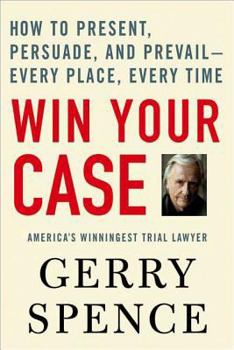Win Your Case: How to Present, Persuade, and Prevail--Every Place, Every Time
Select Format
Select Condition 
Book Overview
Gerry Spence is perhaps America's most renowned and successful trial lawyer, a man known for his deep convictions and his powerful courtroom presentations when he argues on behalf of ordinary people.... This description may be from another edition of this product.
Format:Paperback
Language:English
ISBN:0312360673
ISBN13:9780312360672
Release Date:November 2006
Publisher:St. Martin's Griffin
Length:304 Pages
Weight:0.05 lbs.
Dimensions:0.8" x 6.4" x 8.3"
Customer Reviews
5 ratings
Much better than I expected (and I was expectiong alot)
Published by Thriftbooks.com User , 15 years ago
I was expecting to read insightful thoughts about how to win my case. What I didn't expect was to read insightful thoughts about how to enjoy my life and how to improve myself. And all that with a really smooth writing style that you find enjoyable to read for many hours.
A Book That Transfers Raw Emotion
Published by Thriftbooks.com User , 18 years ago
Gerry Spence has a rather eloquent way of describing what charisma is: "Charisma is the controlled transfer of raw emotion." It seems the whole book revolves around his definition of charisma. Once you have raw emotion you could then use tools like visual aids (and the book goes into details of this sort but always reminding the reader to be real) and so forth to transfer raw emotion to someone else (or a jury), in a controlled way. It is the charisma that helps you present, persuade and prevail every place, every time, as the book's subtitle promises. And the book certainly transfers.
I hope few litigators read this book
Published by Thriftbooks.com User , 18 years ago
Every litigator has heard that you need to tell a story at trial. And most have heard that you need a theme. A lawyer's credibility is important at trial. More than a few, perhaps, have themselves uttered these lines to themselves and to others. But what does it actually mean, and how are we to do it? Even those who have been to trials, actually stood in the well of the courtroom and even won, often don't seem to know. "Runaway jury" they will mutter when they lose. Or what about the famous criminal defense attorney who begins his closing with the stirring: "Ladies and gentlemen of the jury, the state has not satisfied its burden in this case." Not that he didn't commit this brutal bloody murder, but that the state has not satisfied some legalistic opaque formula of weighing. Trials often seem to a test of who can do the least bad job -- if both sides drone out their scripts of openings, not daring to look over the podium at the jurors then who can tell who's doing the better job. Why can't litigators tell their stories convincingly? First, they may not believe their own stories enough. Second, institutional pressures, the "platooning" of responsibilities prevalent in large firms and just simple fear, fear of doing other than the plodding jobs they have seen in court, fear of reaching out and trying to understand the feeling of the decision makers, and their fears may stand in the way. Also, there is ignorance. There are countless ways to do things at trial poorly and a mere handful of people who do them really well. Spence's book addresses the fear, the ignorance and how to be crdible and why. The example sequences of client inteviews, voire dire, direct examinations and crosses are breathtaking particularly if you have sat at trial listening to the direct by your side in a case you helped prepare thinking "what the heck is our guy talking about, I don't understand" (and how will the jurors?) Every trial lawyer should read this, but I hope they don't because it will just make my job harder.
Lessons from the master
Published by Thriftbooks.com User , 18 years ago
Any practicing trial lawyer would benefit from this book. I have tried in excess of eighty jury trials and am constantly on the lookout for means and methods of improvement. Spence's approach is different from any other. His de-emphasis on traditional trial "techniques" favoring instead to focus on knowing one's true self, and recognizing the profound uniqueness of each of us, is the linch-pin of his approach. Only when we truly know ourselves can we hope to know our clients, opponents, witnesses and the decision-maker, be it judge or jury. And whereas most professional advocates have been taught to remain emotionally removed from their cases and causes, Spence suggests that genuine care is required if one is to win consistently. This care must, of course, be channeled and applied thoughtfully. This book contains many examples of Spence's methods applied to different stages of the trial process (voir dire, opening, direct exam, etc.) and to specific fact patterns. Does it work? The proof is in the pudding. Spence has amassed a string of trial victories, civil and criminal, unmatched by any other contemporary trial attorney. All attorneys should buy and absorb this book. All clients should buy this book and give it to their attorneys.
The Spence Method: Explained
Published by Thriftbooks.com User , 18 years ago
I thoroughly enjoyed the book. I have read most of his other books. Its application to lawyers and others on how to persuasively win their cases using many of the same methods taught at the famous Trial Lawyers College in Wyoming is invaluable. Easily the best book on trial advocacy I have ever read, more useful than his prior excellent book released ten years ago, How To Argue and Win Every Time. It should be required reading in every law school.





